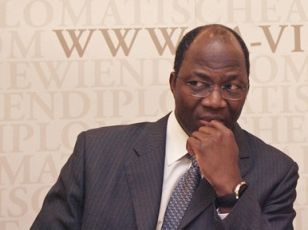Sudan blames Darfur mediator for his support to rebels’ rapprochement
January 6, 2011 (KHARTOUM) — Sudan criticized today the Join Chief Mediator Djibril Bassole for his support to an understanding released by rebels groups who vowed to work together in the negotiations for peace in Darfur.

The Justice and Equality Movement (JEM) and the Liberation and Justice Movement (LJM) on 29 January committed themselves to work hand to hand for the first time in the peace process held in Doha.
Djibril Bassole praised the reconciliation of the two movements as he used in the past to point out that division among the rebel groups is one of the reasons obstructing the Doha talks.
Last March JEM refused the involvement of LJM rebels in the peace process and walked out of the talks in May to protest against parallel track between government and LJM.
However Sudanese government expressed its “dissatisfaction with some steps” taken by the joint mediator Djibril Bassole during a meeting of the Tripartite Mechanism on Darfur held on 3 February in Addis Ababa.
The Sudanese delegation blamed Bassole for praising the understanding reached by JEM and LJM which “included a mention to the existence of genocide in Darfur,” said the spokesperson of the ministry of foreign affairs, Khalid Moussa on Sunday.
The statement of the joint mediator “contravenes the position of the African Union and the United Nations in this regard and makes Bassole’s stance inconsistent with the position of the official bodies which he represents as joint mediator,” he said.
Relations have turned icy recently between the mediators and Ghazi Salah Al-Deen presidential adviser in charge with Darfur file. The Sudanese official pressed the mediation to conclude the talks in Doha with the LJM and refused at the same time a compromise they presented on the pending issues.
In a press conference held in Cairo on 23 January, the Qatari state minister for foreign affairs told reporters that Khartoum accepted to give a position of vice-president to Darfur region as the rebel demand. But Ghazi, in an extensive statement swiftly, refuted what Al-Mahmoud said.
Further, while Khartoum seeks to bring home the efforts to end Darfur conflict, Al-Mahmoud and Bassole sought to gather regional and international support to Doha forum. They held a series of meetings and trips in this regard. The Afro-Arab ministerial committee in January backed their efforts and called to make Doha as sole venue for all the initiatives on Darfur conflict.
Sudan’s delegation to the tripartite meeting chaired by the Undersecretary of the Foreign Affairs Ministry, Rahamtalla Mohamed Osman also “criticized the unjustified position of the joint mediator against the Darfur-Darfur Political Dialogue which is part of the joint understandings between the government, international community, UNAMID, United Nations and the African Union,” said the spokesperson of the foreign ministry.
The Sudanese government said determined to conclude any efforts to end Darfur conflict before July as it prepares a new permanent constitution once the South is officially established in an independent state.
In a speech delivered before security and intelligence officers on Sunday, President Omer Al-Bashir said his government will pursue the implementation of the new strategy to end the conflict through dialogue with local actors, development and promotion of IDPs return.
Bashir pledged that “Darfur would be clean from the outlaws (rebels) before the end of July”.
Established in 2008 between the Sudanese government, AU and UN, the Tripartite Mechanism initially was seen as a tool to build confidence between the three parties but also to facilitate the establishment of the UNAMID and to boost its cooperation with the Sudanese authorities.
Held in Addis Ababa, the tenth meeting of the mechanism focused on the Darfur Political Process, security and freedom of movement, early recovery development, the issue of water, and UNAMID Radio that the government shows reluctance to authorize since two years.
The delegations were headed by Rahamtalla Mohamed Osman, Undersecretary of the Ministry of Foreign Affairs, GoS; Ramtane Lamamra, Commissioner for Peace and Security, AU; Alain Le Roy, Under-Secretary-General, Department of Peacekeeping Operations, UN and Susan Malcorra, Under-Secretary-General, Department of Field Support, UN; and, Joint Special Representative Ibrahim Gambari, UNAMID.
(ST)
